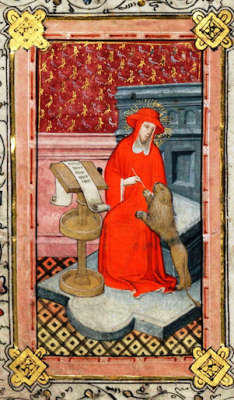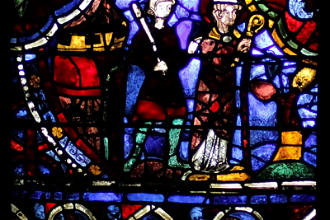Jesuit collections bring history to life in two major London exhibitions

Wolsey's Book of Hours
Two spectacular exhibitions have, after pandemic delays, finally opened in London on the same day - at Hampton Court and the British Museum, both celebrating big number anniversaries thanks to important Jesuit loans.
Field of Gold
Gold and Glory: Henry VIII and the French King, which runs at Hampton Court Palace until September 5th, commemorates the 500th anniversary of the fabulous political event known as the Field of Cloth of Gold - an 18-day meeting in 1520 between Henry VIII and François I that was unparalleled in its lavish demonstration of wealth and power.
Perhaps the star exhibit is the unique Henry VII cope, made from cloth-of-gold and red silk damask and which belongs to the British Jesuit Province. This garment is the sole survivor from a set of twenty-nine extremely prestigious velvet copes commissioned by Henry VII for Westminster Abbey in the late 15th century. The complete set was borrowed by Henry VIII in 1520 to take to the royal summit. By 1608, only eleven of the twenty-nine were still in the Abbey, and these were burned in 1643.
Dr Jan Graffius, Curator of the Stonyhurst Collections, said: "This cope is the first recorded illustration of the Jesuits' long history as 'keepers of memory' of British Catholic material and spiritual culture. Its presence at the English Jesuit College of St Omers in Flanders was first mentioned in October 1609, and it had arrived at the college via the recusant Cotton family, who were supporters of Saints Edmund Campion and Robert Southwell.
Recusant English Roman Catholics remained loyal to the Pope and the Roman Catholic Church and refused to attend services of the Church of England from the period about 1570 to 1791, thereby committing a statutory offence.
"The cope is an illustration of the much-overlooked history of the Jesuits as the primary conduits, recorders and re-interpreters of an extraordinary wealth of English and Welsh pre-Reformation and recusant material culture."
The Gold and Glory exhibition is being held in the very rooms of Hampton Court Palace that were used by Cardinal Wolsey - the brainchild of the Field of Cloth of Gold event. Stonyhurst College has lent the Cardinal's Book of Hours, a beautifully illuminated manuscript gifted to Wolsey by a fellow Cardinal and now belonging to the school.
Murder in the Cathedral
Thomas Becket: Murder and Making of a Saint at the British Museum runs until August 20th and examines the life, murder, spiritual and political influence of the hugely famous 12th century Archbishop and martyr. Becket's life ended in a bitter dispute with Henry II that culminated in his violent and public death. Marking the 850th anniversary of Becket's brutal murder in 1170, the exhibition includes the rare, possibly unique, relic of Becket's skull, that is owned by the British Jesuit Province and held at Stonyhurst College.
Dr Jan Graffius said: "The relic has been in Jesuit ownership since the late 16th century, only some fifty years after the destruction of Becket's shrine at Canterbury at the orders of Henry VIII. The small piece of Becket's skull was rescued in 1540 when his bones were removed from the shrine."
The piece of Becket's cranium, belonging to the British Jesuit Province and held on loan at Stonyhurst, has a provenance dating back to 1593, and was recorded by the English Jesuit missionary, John Gerard:
I was given a silver head of St Thomas of Canterbury, and his mitre studded with precious stones. The head is small and of no great value in itself, but it is quite a treasure because it contains a piece of the saint's skull. It is the breadth of a double gold crown and it is thought to be the piece that was chipped off when he was so wickedly slain.
Dr Jan Graffius continued: "Like many other relics collected by Gerard, this piece of Becket's skull was smuggled across the Channel to safety at the English Jesuit College of St Omers. In 1666 it was remounted into a silver-gilt brooch inscribed 'EX CRANIO St THOMAE CANTUARENSIS', which fastened to the front of a flamboyant silver statue of Becket. Both the statue and the relic form part of the exhibition."
Stonyhurst College has also lent a rare book of saints' feast days, printed in the early years of King Henry VIII, in which the feast of Thomas Becket has been defaced and scored through, in accordance with the King's reforms. Other lent items include the Jesuit Province's unique gold and enamel reliquary, thought to have been designed by Hans Holbein, and a crucifix from the Stonyhurst collection. Both of these stunningly beautiful artefacts belonged to St Thomas More, whose memory was linked to that of his namesake, Thomas Becket, recollecting two saints who defied royalty for the sake of conscience.
Details of the two exhibitions can be found here:
www.hrp.org.uk/hampton-court-palace/whats-on/gold-and-glory-henry-viii-and-the-french-king-exhibition/
www.britishmuseum.org/exhibitions/thomas-becket-murder-and-making-saint


















